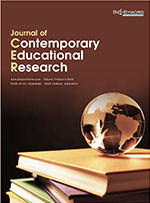Abstract
Foreign language education is an important part of Chinese education, but the overall foreign language education in China is still relatively underdeveloped. Foreign language education and policies in contemporary China are closely related to China’s political, economic, and social development. The contemporary Chinese foreign language education and policies, since the establishment of New China in 1949, can be divided into four periods. The first period is a period of domination by the Russian language (1949–1956), the second period is a period of exploration and transformation (1956–1966), the third period is a period of interruption (1966–1978), and the fourth period is a period of development and improvement (1978 to present). Understanding foreign language education and policies in contemporary Chinese universities can contribute to the future development of foreign language education and policies in China.
References
Zhou Q, 2019, Seventy Years of China’s Language Policy Studies. Journal of Xinjiang Normal University (Philosophy
and Social Sciences), 40(06): 60–71 + 2.
Zhao R, 2014, Foreign Language Planning and Policy in China: Essential Issues. Journal of Yunnan Normal
University (Philosophy and Social Sciences), 46(01): 1–7.
Shen Q, 2019, 70 Years of Foreign Language Education Planning of China: Paradigm Changes and Strategic Shifts.Journal of Xinjiang Normal University (Philosophy and Social Sciences), 40(05): 68–77.
Xu J, Tang S, Yao Y, 2017, Investigation and Analysis on Application Abilities of Innovative Talents in English.
Journal of HUBEI Correspondence University, 30(6): 141–145.
Gao Q, 2016, An Important National Security Barrier Strategy and Foreign Languages Education Policy in Tibet.
Journal of Tibet University (Social Science), 31(02): 107–111 + 178.
Pan H, Zhang L, 2011, Penetrating Analysis of National Interests in American Language Policies. Journal of
Northeast Normal University (Philosophy and Social Sciences), 253(5): 97–100.
Wu C, 2012, Foreign Language Policy and Foreign Language Education in the United States. China Adult Education,
(02): 96–98.
Guo F, 2020, Evolution of Foreign Language Education Policy and Planning in China. Journal of Southwest
University of Science and Technology, 37(06): 81–87.
Hu W, 2009, Achievements and Deficiencies in Foreign Language Education in the Sixty Years of New China.
Foreign Language Teaching and Research, 41(03): 163–169 + 240.
Qin Y, 2014, The Implementation of Foreign English Language Policy and Its Enlightenment. Journal of Shanxi
Normal University (Social Science) Graduate Thesis Special Issue, 41(S4): 141–143.
Hu Z, 2022, A Comprehensive View of China’s Foreign Language Education Policies. Computer-Assisted Foreign
Language Education, 204(02): 3–8.
Cheng J, 2015, Research Status and Development Trends of Foreign Language Policy and Planning in China. Foreign
Language Education, 36(5): 69–72.
Cai J, 2003, Foreign Language Ability Cultivation and China’s Foreign Language Policy. Foreign Languages and
Their Teaching, 170(5): 29–32.
Zhao R, Guo J, 2010, Compilation of Foreign Language Management Policies and Regulations, China Foreign
Language Strategy Research Center, Shanghai International Studies University.
Shen Q, Bao M, 2018, Foreign Language Education Planning in China Since the Reform and Opening-Up. Language
Strategy Research, 3(05): 21–31.
Su X, 2021, Research on the Training Strategy of “9+3” Tibetan Students’ English Application Ability Oriented to
Post Demand in Higher Vocational Stage. Journal of HUBEI Open Vocational College, 34(15): 167–168.
Gao J, 2014, Reflections on Foreign Language Policies under the Background of the New Silk Road Economic Belt.
Journal of Southeast University (Philosophy and Social Sciences), 16(4): 125–128 + 136.
Jia A, 2007, On National Foreign Language Education Policy: A New Strategic Perspective. Foreign Language
World, 2007(5): 91–96.
Zhang Z, 2018, Classification of Language Securities and Its Use in China. Journal of Yunnan Normal University
(Philosophy and Social Sciences), 50(03): 35–44.
Ji X, Jing J, 2018, Cultivation and Assessment of Students’ English Competency in the Netherlands. Journal of
Huaihai Institute of Technology (Humanities & Social Sciences Edition), 16(09): 136–140.
Chen B, Wu S, Lan Q, et al., 2021, The Influence of American Foreign-language Education Policy on Chinese
Education and the Existing Chinese Teaching Resources. Journal of Yunnan Normal University (Teaching Chinese as
a Foreign Language and Research), 19(4): 2–17.
Lu Z, 2006, The National Security Objectives of the US Foreign Language Policy and Their Implications for China.
Socialism Studies, 163(3): 115–118.
